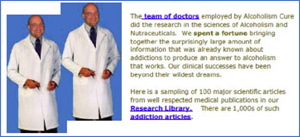A federal court in Florida has ruled in favor of the Federal Trade Commission and the Florida Attorney General, and ordered the marketers of a phony alcoholism “cure” program to pay more than $700,000 for having tricked consumers into paying hundreds or thousands of dollars to participate in the program.

On its website, ACF repeatedly made representations about its “team of doctors” and its extensive research library
The court’s order follows its September 2011 ruling upholding the FTC’s and Florida Attorney General’s charges that the defendants prescribed ineffective concoctions of dietary supplements as a supposed cure for alcoholism, and then threatened to publicly reveal consumers’ alcoholism when they tried to cancel their memberships. The complaint, filed in March 2010, named Jacksonville, Florida-based Alcoholism Cure Corporation and its owner, Robert Douglas Krotzer. It charged the defendants, who also did business under the names Alcoholism Cure Foundation, Enjoy A Few, and Guilt Free Drinking, with deceptively peddling their program, ultimately taking in at least $732,480 from about 450 consumers. Online ads referred to defendant Krotzer – who is not a doctor – as “Dr. Doug,” and boasted that the company’s “team of doctors” would create customized, low-cost, and permanent alcoholism cures. The court upheld the complaint allegations, ruling that the defendants made false and unsupported claims that their program “cures alcoholism while allowing alcoholics to drink socially.” The defendants also deceptively claimed that the program had the “best technology to end alcohol abuse permanently,” and was “scientifically proven to cure alcoholism.”
The court also found the company and Krotzer falsely claimed that their program cost about $350 and consumers could cancel anytime, that consumers would be monitored by trained professionals, and that the defendants would keep consumer information private. When consumers tried to cancel their memberships, the defendants “routinely used disclosure of personal and health information as a threat to extract payment” and made “impossible demands” that consumers submit so-called “proofs of continued drinking,” including expensive lab test results and hair samples. The defendants also charged consumers’ financial accounts for fees they supposedly owed – ranging from $9,000 to $20,000 – without authorization. After threatening to disclose consumers’ alcohol dependence, the defendants actually did so in some cases: by telling PayPal, credit card companies, and the Better Business Bureau; by filing the information publicly in Florida small claims court; and by exposing the entire database of consumer information to the debt collectors they hired to pursue the fees.
The court’s final order permanently bans the defendants from marketing or selling any treatment or cure for alcoholism, drug addiction, or any other human health-related problem. The final order also prohibits the defendants from using trade names such as “alcoholism cure” or “permanent cure,” from unauthorized billing, and from taking any further collections actions against their victims. The defendants also may not misrepresent the cost or terms of any offer they make, the professional qualifications of Krotzer or any employee, or that the company is a charity. Finally, the order requires the defendants to pay $732,480, to be used for consumer refunds, if practical.
The FTC would like to thank its law enforcement partner, the Florida Attorney General’s Office, for its assistance in this case.
Consumers should carefully evaluate advertising claims for dietary supplements. For more information see: Miracle Health Claims: Add a Dose of Skepticism.
The complaint was filed in the U.S. District Court for the Middle District of Florida, Jacksonville Division, on March 29, 2010. The court entered a summary judgment against the defendants on September 16, 2011, finding for the FTC and the State of Florida on every count. On July 3, 2012, the court entered the final judgment and order.
The Federal Trade Commission works for consumers to prevent fraudulent, deceptive, and unfair business practices and to provide information to help spot, stop, and avoid them. To file a complaint in English or Spanish, visit the FTC’s online Complaint Assistant or call 1-877-FTC-HELP (1-877-382-4357). The FTC enters complaints into Consumer Sentinel, a secure, online database available to more than 2,000 civil and criminal law enforcement agencies in the U.S. and abroad. The FTC’s website provides free information on a variety of consumer topics. Like the FTC on Facebook, follow us on Twitter, and subscribe to press releases for the latest FTC news and resources.
(FTC File No. 082-3222)
